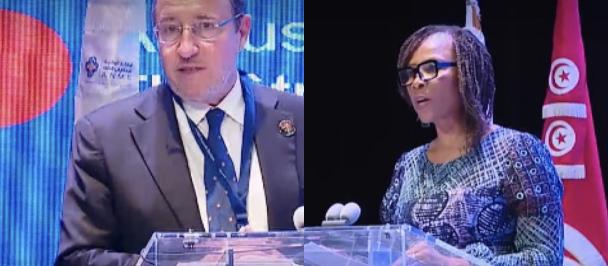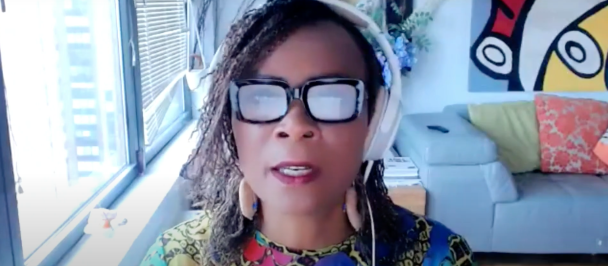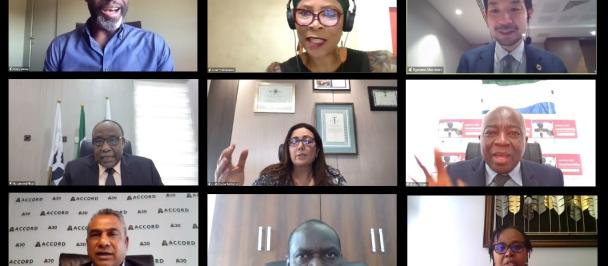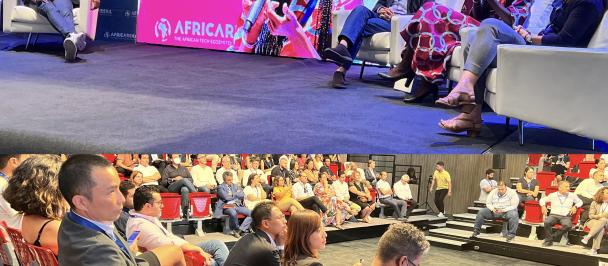TICAD 8 side event
Strategic partnerships needed to improve access to justice for women and girls across Africa
October 4, 2022
Despite progress made by governments, civil society and other international organizations, women and girls still face many challenges in accessing justice, according to panelists at a side-event ahead of the recent 8th Tokyo International Conference on African Development (TICAD8), held in Tunisia from 27 to 28 August.
A recent survey by Japan International Cooperation Agency (JICA) on improving access to justice in Africa revealed that rule of law reforms in many African countries remain fragile, leaving marginalized populations highly vulnerable to exclusion, discrimination and extreme poverty.
“The results of the survey shows that in many countries, courts are relatively few and concentrated mainly in urban areas while the high cost of litigation also limits the number of citizens who can bring cases to the courts to resolve disputes,” said Ms. Katsura Miyazaki, JICA Director-General for Governance and Peacebuilding Department.
Cultural practices often influence informal dispute resolution systems, the report showed and called for greater attention to issues related to women’s human rights, especially gender-based violence (GBV).
Ms. Miyazaki highlighted that strategic partnerships such as the collaboration between JICA and UNDP are essential to improve justice for women and other vulnerable groups and for the overall realisation of Sustainable Development Goals (SDGs), especially SDG 5 to promote the active role of women in law and justice.
Panelists noted that the impact of the overlapping crises of COVID-19, the climate emergency and rising economic and political insecurity have reversed progress toward gender equality.
“To avoid such costly setbacks, we must scale up our efforts to bridge short-term recovery with long-term transformation. That means investments in community resilience, social justice, and participatory decision-making,” noted Ms. Asako Okai, UN Assistant Secretary-General, UNDP Assistant Administrator and Director of the UNDP Crisis Bureau.
Such investments, added Ms. Okai, are at the heart of UNDP’s Rule of Law and Human Rights Global Programme, which places a people-centred approach to development amid widespread challenges to equal justice for women. “For women and indeed for our collective future, we must move from a culture of reaction to one of prevention. That means tackling vulnerability at its source, building resilience, and strengthening the social contract between people and state,” she said.
The Sustainable Development Agenda, adopted by UN Member States in 2015, set a 2030 deadline for the achievement of gender equality and the empowerment of all women and girls. However, with under 10 years left to meet it, the world is not on track to meet this goal.
Moderating the panel discussion, Dr. Roselyn Akombe of the UNDP Regional Service Center for Africa noted that increasing participation of women in the judiciary is fundamental to achieving a people-centered approach to governance.
Director of the Judicial Training Institute of Mozambique Judge Elisa Samuel Boergkamp said the conversation was timely considering ongoing human rights violations against women and girls in northern Mozambique.
Despite gender justice and gender equality being crucial components of promoting good governance and enabling a rule of law-based society and sustainable peace, Judge Boerekamp pointed out that there is a glaring lack of women within the judiciary.
Stressing the importance of gender diversity, she said a diverse judicial workforce not only helps bring different voices and perspective to the bench, but also strengthens the integrity of the judiciary, eliminates gender stereotypes and increases the willingness of women to enforce their rights.
“We can’t talk about the rule of law without women in the judiciary and women accessing justice,” said Judge Boerekamp, adding that judicial systems could do well to integrate gender equality into their policies and programmes and increase the development and delivery of gender-sensitive training for all judiciary staff.
Mr. Stephen Oguna, Programme Legal Officer at KASH (Keeping Alive Societies’ Hope) in Kenya reminded the panel of the importance of civil society in advocating for the meaningful participation of women in the justice sector and including greater community participation in the formulation of laws and legislation.
“It is unfortunate that parliament gives only a few citizens the opportunity to take part in these discussions. Kenya has not yet passed the public participation act despite our constitution reflecting the importance of such participation. As a result, we pass many laws that infringe on the rights of women,” Mr. Oguna highlighted.
He recommended that civil society organisations have a greater role in policy discussions and law-making processes by championing citizen-centred participation to provide women equal opportunity as decision-makers at community, country and national assembly levels in order to play an effective role in monitoring the accountability of governments.
KASH was launched in 2003 to influence society to enable key and marginalised populations to access justice, health, good governance and economic empowerment through stakeholder engagement, including through the UNDP/Amkeni Wakenya PLEAD programme funded by EU.
Applying a transformative people-centered approach to advancing justice for women in Africa also requires strong data, information and analysis regarding the country specific barriers preventing or frustrating women’s rights and participation.
Ms. Lucianna Thuo, an advocate at the High Court of Kenya and Associate Dean at Kabarak University’s School of Law, said there are three broad categories of barriers to entry for women to the justice system. These include stereotypes and negative perceptions about the capacity of women to resolve disputes; a lack of political will to appoint women as judges; and minimal appointments made in order to appease public perception of judiciaries.
To level the playing field and encourage the full participation of women in shaping justice systems in Africa, Ms. Thuo recommended women in judiciaries to actively seek out competent female candidates and encourage them to apply. Additionally, highlighting successful role models in judiciaries would assist in countering negative stereotypes. It is also important that gender audits are conducted to identify and address institutional policies and implicit gender biases.
JICA has also conducted a survey on improving access to justice and establishing a network in African countries that identified both barriers to and opportunities for greater access to justice for women and emphasised the importance of regional cooperation and knowledge sharing to address these and other justice issues.
Panelists agreed that the joint initiative between JICA and UNDP to support women’s empowerment and access to justice in Africa is an important opportunity to share strategic findings, identify gaps and create opportunities for future collaboration towards shared goals.
The session can be viewed at: TICAD8 Side-Event:Justice Aug. 26 (Fri), 2022 - YouTube

 Locations
Locations


